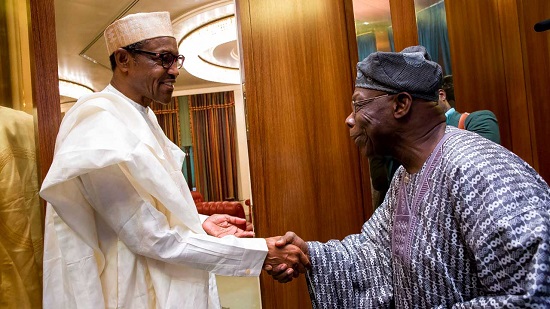This post has already been read 2045 times!
• Alleges poor consultation on AfCFTA, fiscal indiscipline
• Nigeria’s renegotiation delaying ratification, says official
• Russia seeks more commitment to raise deals above $20b
Former President Olusegun Obasanjo has lamented that nepotism in Nigeria is obstructing the fight against corruption.In what seemed like reporting the country’s leadership to the world, the elder statesman, before a gathering of investors at the ongoing yearly meeting of the African Export-Import Bank (Afreximbank) in Moscow, accused the administration of President Muhammadu Buhari of fiscal indiscipline and bias in the fight against corruption.
He described corruption and development as strange bed fellows, warning that people in authority would remain deluded as long as their definition of corruption is when money, goods and services are involved.
“Nepotism is a form of corruption and condoning what is bad is a height of corruption. Lack of fiscal discipline is corruption. So, corruption and development cannot meet. You must eschew corruption to make sure that you make significant progress.
The government’s alleged shoddy consultation was also blamed for the delay in the ratification of the African Continental Free Trade and Agreement (AfCFTA), acclaimed the largest free trade agreement in the world. Obasanjo told investors that while there is no confusion on what the deal is, private sector operators became disillusioned over the government’s alleged inaction and poor consultations after it had taken the lead in design and execution.
He expressed hope that Nigeria would sign the deal before the July 7 launch in Niamey.“Nigeria will not be absent at the launch of the AfCFTA. But I see no reason why Nigeria can be present at the launch when it has not signed the agreement. It is out of place. Eritrea and even Niger and Benin who are our neighbours have signed, and Nigeria is counting itself out.
“If you heard the statement of the permanent secretary in the Ministry of Trade today, there is nothing more beautiful than that, but he is not a policy maker, he is a policy executor.
“He will have to go home and tell the policymakers that he made the right statement, so it’s now their turn for action. I hope that when he gets home and says it’s time for right action, they will follow through,” he said.
But Gabriel Aduda, Permanent Secretary (Political and Economic Affairs) at the Office of the Secretary to the Government of the Federation, said the delay was not indicative of government’s doubt on the initiative, but the consequence of ongoing renegotiations.He explained that Nigeria wants to ensure that some protective steps are put in place, lest the country becomes a dumping ground.
“With time, Nigeria is going to sign. But we have to do what China did, even with the world trade agreement – they gave a condition. And that is what we are going to do. You do not expect a country like Nigeria to be given the same size of cake with a country like The Gambia, even though we are all in Africa.
“You cannot just go ahead and enter into an agreement with a neighbouring nation without looking at who is standing behind that nation. How are you going to protect yourself?
“Though we need a free and fair deal, how also do we protect ourselves to ensure that we do not just become a dumping ground? These are some of the issues we are looking at, at the moment. Absolutely, we are coming back to the table to say, “this is what we want,” Aduda said.
Earlier, Sergey Lavrov, Russia’s Minister of Foreign Affairs, expressed his country’s willingness to contribute more to the development of the African continent, disclosing that over $20 billion worth of investments was done in Africa in 2018.
“Russia is building a long-term relationship with Africa and has become a shareholder in Afreximbank. To give an additional impetus to all our cooperation, including commercial and economic, it was decided to jointly organise the first Russia-Africa summit in October 2019 in Sochi.
“We are waiting for African Heads of State and Government, leaders of the African Union and other major sub-regional organisations to key into our partnership and hope that Afreximbank will contribute to the substantial content of the economic part of the programme, which seems very solid,” he said.
[The Guardian]



